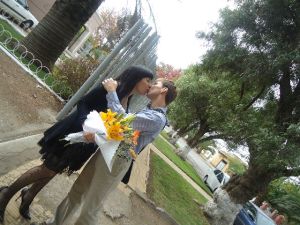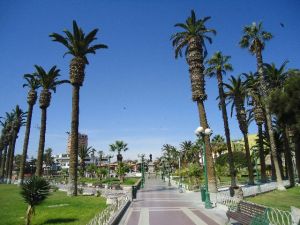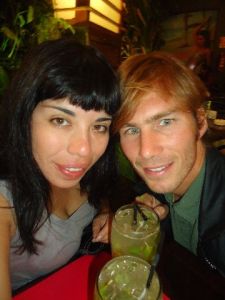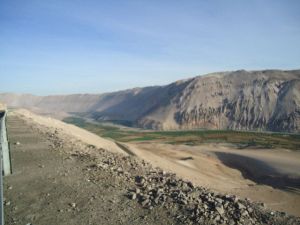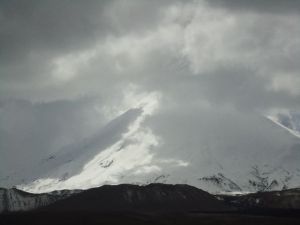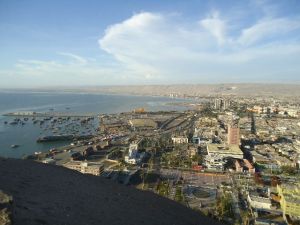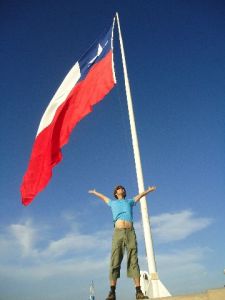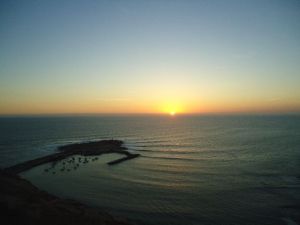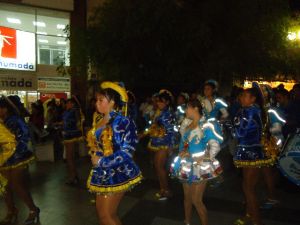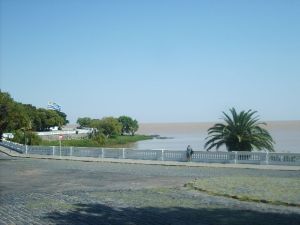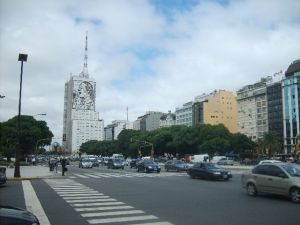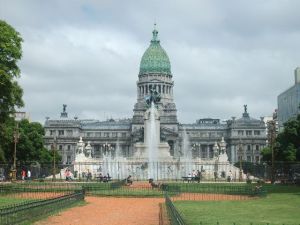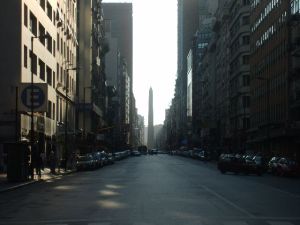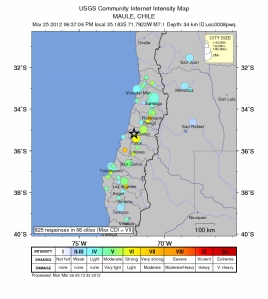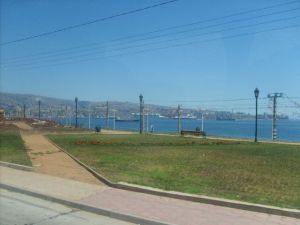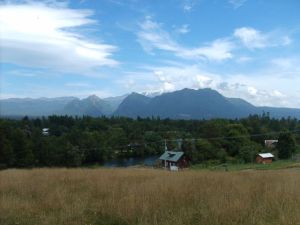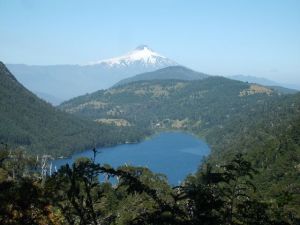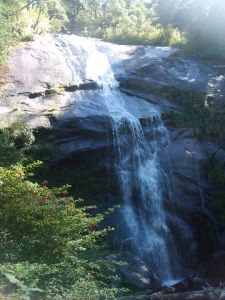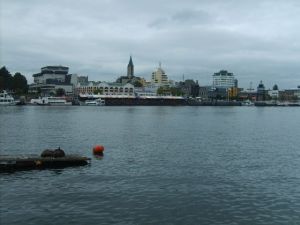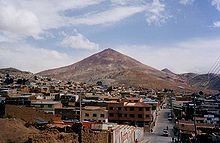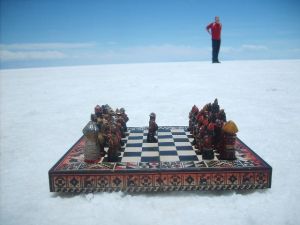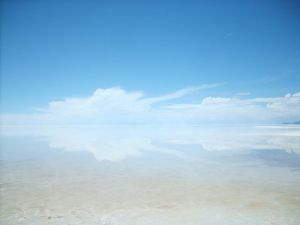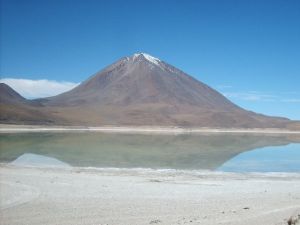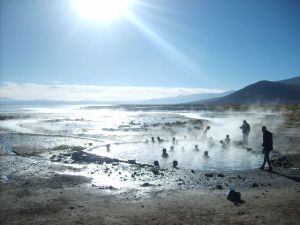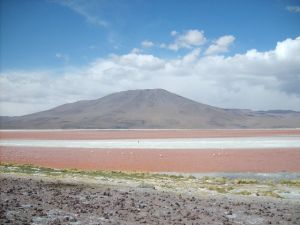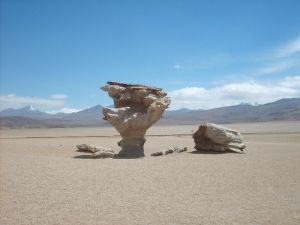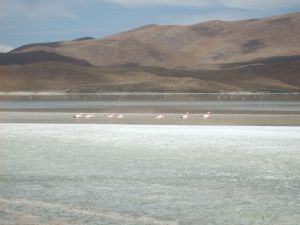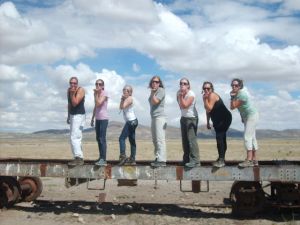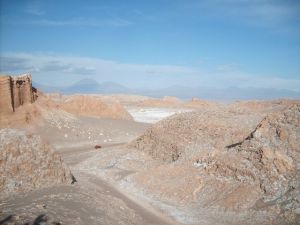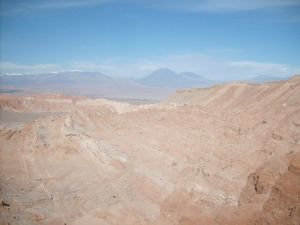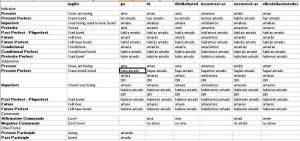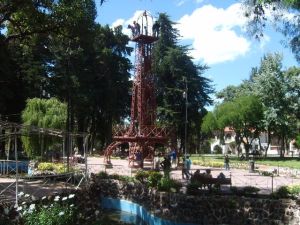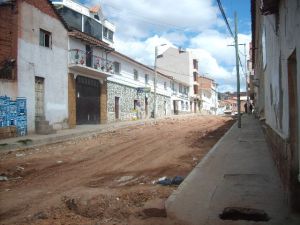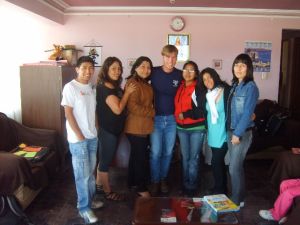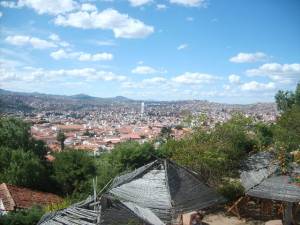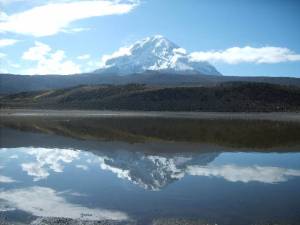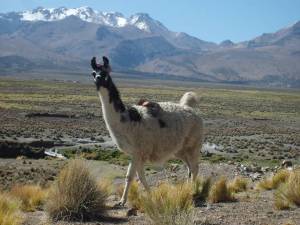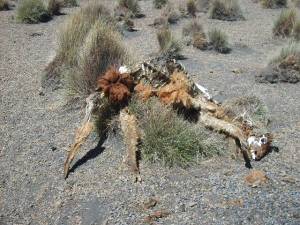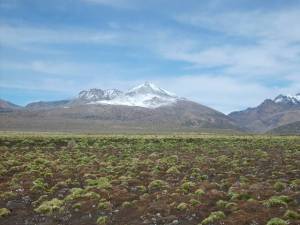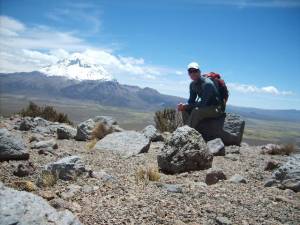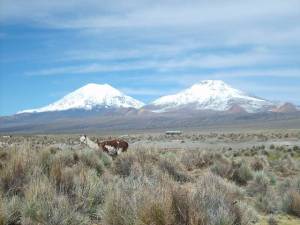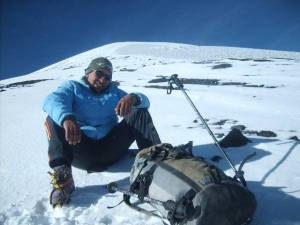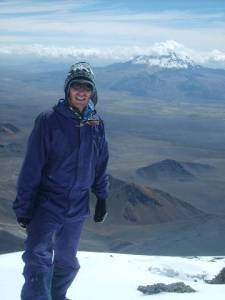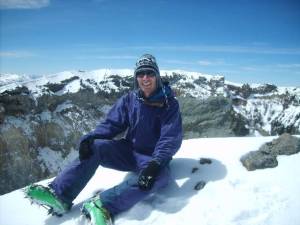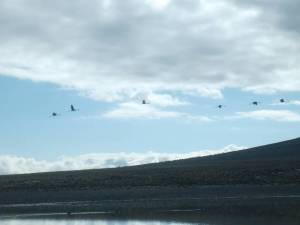Introduction
Meanwhile I passed the 5th month on the road and the whole travelling is slowly transforming into some sort of routine. Although the beer tastes different in every country, the basic flavour stays the same. In other words: memories of places start to blur, later memories get confused with earlier ones, names disappear… well, you know, the long term traveller’s Alzheimer, I suppose. Recently I was asked by another traveller how Valdivia was like, a place I’ve been to some weeks ago. My answer was: “Well, I couldn’t tell you exactly why, because right now, I don’t remember the city, but I do remember that I liked it a lot and therefore I’m sure it’s kind of neat”. In the course of another beer I remembered and I was able to tell details of the old town like the submarine, the bridge over the river to the university property and the fine little coffee shop at the museum of archaeological history. That was a sign to me: not being able to tell about places I’ve been to. I haven’t found out yet the sign’s significance, but I’m working on it.
Well, one of the reasons I kick my ass to write about my travels is indeed to prevent forgetting. Though I don’t have the time, the space and the will for writing down everything, and sometimes I want and I have to respect the privacy of me and the people I meet. At some point we all just have to deal with the fact that we are not computers and tend to forget things (which sometimes is an advantage).
Chiloé and Bariloche
As indicated last time, in Puerto Montt we met Alba and Lis, her sister, for visiting the island of Chiloé. It was, as you can imagine, a great advantage to have Chileans as guides. The bad thing was that about half of the time the weather sucked. The other half was well used to explore Chiloé’s national park at Cucao and the island of Mechuque, where we spent some time walking around, boat riding and enjoying the beautiful forests and green meadows in spectacular landscapes. But see for yourself.
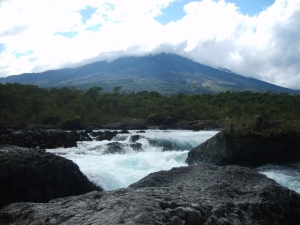
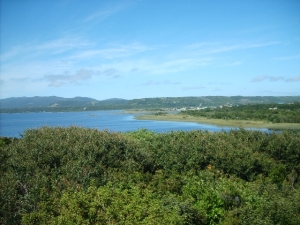
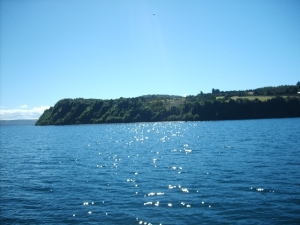
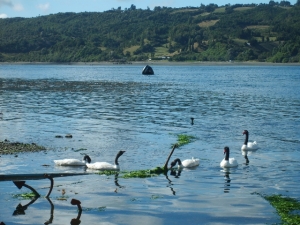
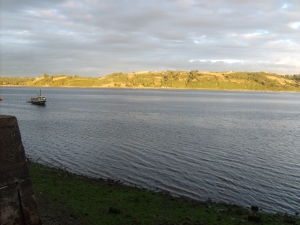
Back in Puerto Montt, after having a very wonderful week, we also reached a point of decision. The question was: How can we continue? How should we go on? It’s a far way to go and the road would be full of obstacles and uncertainties. A hard decision to make but finally it was resolved without doing much, because we soon discovered that the number of considerable options came down to 2. We could get a boat down from Puerto Montt to Puerto Natales and visit from there all the great Patagonian National Parks. But this option failed because the boat only run’s every Friday and we got itinerary until Sunday with our hosts. But the ship was full anyway and waiting in rainy and cold Puerto Montt for another 5 days was completely out of question. The only option left was to take the bus along road 40 in Argentina to Puerto Natales for some 40 odd hours. To lessen the pain, shorten the busriding time and to do all the work we didn’t do while we were on Chiloé we agreed to go first to Bariloche in Argentina which is some 6 hours away. Bariloche was not on my schedule and I didn’t want to go there as Marta, my Argentinian Spanish teacher back home, previously told me it’s not worth a visit because it’s exactly like Switzerland. Which is true. When you’ve been to classical ski resorts, you know more or less how it looks like. It’s neat, though. And it gave us some time to reload all our things, do some shopping and plan ahead.
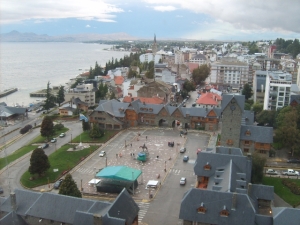
View from our hostel over Bariloche
El Calafate and Perito Moreno
From Bariloche we took the 28 hours bus ride to El Calafate where we visited the spectacular glacier of Perito Moreno. The bus ride along carretera 40 was supposed to be very boring. But we both agreed it wasn’t. The landscape with hills, mountains, lakes and even the monotone Pampas was beautiful. Furthermore, with a bit of reading, music, writing and sleeping the 28 hours turned out to be too short for a stress free journey. Anyway, the visit to the glacier was a real blast. We took a tour to the glacier that included a 90 minute walk on the glacier. Though the weather was not that good and I thought it rather cold, we enjoyed being on this natural paradise. When we were there it was announced that the ice bridge (or they called it tunnel) should brake and TV stations were there to record this nature spectacle. They said it’s either today or tomorrow. Well, we didn’t see it. But it broke the next morning at 4 am. As there was no light, it wasn’t recorded and the world couldn’t witness this event. I imagined if this would have happened in Europe. There would be a big TV show with concerts, comedians and magicians along with celebrity guests from all over the world. The glacier would be illuminated all the time for the whole night. Maybe this wouldn’t even be necessary as the glacier would be prepared in a way that the bridge was to fall at best evening time for the TV channels. Here they just took it and I had the feeling, all the locals were relieved after it happened. An event like this is only expected every 5 – 10 years.
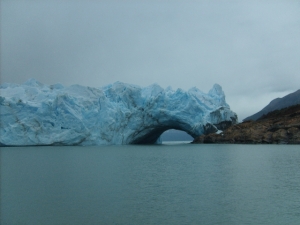
When we were there we could at least witness the fall of several big ice blocs. That was really spectacular as it made a huge thunder noise and released a small tsunami in the Lake Argentine. From further away, it was even more spectacular as you could see the ice breaking and hear the thunder a couple of seconds later. Visiting Perito Moreno, although it his extremely annoying touristy, was definitely one of the very big highlights of my travel!
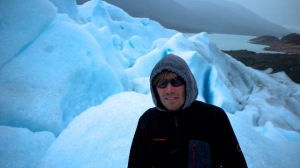
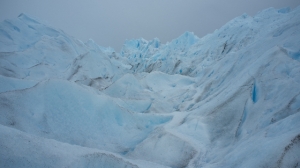
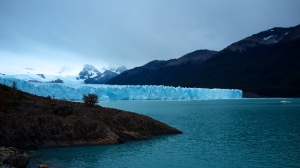
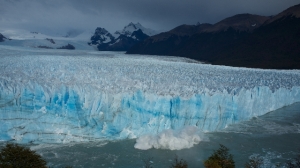
El Chaltén
We took the 3 hours bus to the very isolated El Chaltén. A small town near the tourist attractions of Fitz Roy and Cerro Torre, that was built in the early 90ies only to serve tourists. The place is kind of sterile and was originally probably perfectly equipped with infrastructure. The roads with one car per a day are wider and better than anything else I saw before. But probably El Chaltén was a victim of the Argentinian bankruptcy in 2002. No ATM’s around and the Internet is as slow as it was 1995 with our 28 kb modems. Just reading mails could cost you as much nerves as an emergency landing on Hudson River.
In El Chaltén we realized as well what Patagonia really means: rain, coldness and a wind as strong that you get blown away if you are not careful. I had my first doubts of visiting Patagonia for a longer time. I admire the landscapes, but when you can’t see anything and it’s pouring down mixed with the strongest winds I’ve ever felt, and you’re freezing to the bones, it makes no sense to stay. And the prices in this misery are ridiculously high. Anyway, once there, we had to stay and we took a walk to Lake Torre to another glacier with just a little bit of rain at the beginning, we counted ourselves lucky. The way along the glacier was supposed to be dangerous in strong winds. On the way there, it was no problem. But on the way back I was frequently smashed up the hill because of the wind. It was very difficult just to stay, no talking about walking. Sometimes when I stood and leaned with full power against the wind, I just had to stretch out my arms and I got blown away. This is really the truth, my friends! It was absolutely terrifying!
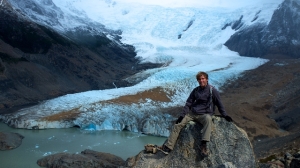
Laguna Torre near El Chaltén
At the police station and a change in plan
In El Chaltén I also had my worst and most annoying experience in my whole travel. I was stupid, I was lucky, I was robbed, it took all my nerves and finally I won two computers and I was relieved! El Chaltén is a peaceful, isolated paradise in terms of crimes. In this town there are only people that earn their money with tourists and the tourists, the more wealthy ones, I suppose. Two groups of people that I would imagine of being the least dangerous kind if you lose something, leave you stuff unattended for a while or get in other some sort of trouble. The first night we ended up at a bar close to our hostel where we drank our last beer before they’d shut down for the night. Really nice place, the waitresses, the beer and all, you know. But I happened to forget my bag right at the bar when we were the last clients to leave. Realizing it at the hostel of course I returned to check, but there was nobody there anymore. So I returned in the morning, looked inside and saw my bag still under the bar stool. Perfect, I thought, it’s still there, so not much to worry about. I returned to the hostel and asked what time the bar would be opening. As it would only open up after noon and we had some plans for our hike I told the lady the story of my bag and we agreed that she would be calling the owner and make sure the bag is kept safe. Nothing to worry about. Just because it’s funny to see my bag still lying under the bar stool and our last beers not been put away from the bar, I told Michelli to look at it too. He found it funny too and decided to take picture of it in order to show the world how stupid I am to forget my bag there. We went on our hike and I didn’t lose any thought about it anymore.
On our return in the afternoon I dropped into the bar to ask about my bag. As the lady didn’t really know about it I shortened it up and said, that I suppose, the lady from the hostel already has it. Back in the hostel, the reception lady told me, she was told there wasn’t a bag. Ok, what went wrong? I remembered the photo from the morning and showed it to her. Things became pretty clear now. I returned to the bar to ask again about my bag. Still, I was told, the cleaning lady, who first entered the place at 9.30 didn’t see any bag. Then I mentioned the picture and showed it to her and proved that it was taken at 8.30 in the morning. So what’s the story now? The cleaning lady stuck to her version that she didn’t see anything. She cleaned the bar, wiped the floor at the bar (!) and didn’t see anything. She didn’t negate the fact that all the time she’s been alone in there, except with a short visit of the owner’s mother who actually was on the phone with the lady of the hostel. Ok, I talked to Manuela, the owner, that she should clear things out with the cleaning lady and I would return some 2 hours later to receive my bag. I wouldn’t go to the police and just forget about it and Manuela wouldn’t fire her. That was our deal. I had practically my life in the bag, everything that was important (Passport, computer with unsaved data, notice book with addresses, names and memories of people I met, a dictionary, the Spanish version of “le petit prince”, an Amazon E-Reader (how I was able to buy this is another outstanding remarkable story which I had in mind to tell you at some point, because it’s real freaky too), my IPod, my camera and some more bullshit. In the bag of the laptop was about 30 US dollars in cash, the equivalent of 200 dollars in Chilean Pesos and a second credit card. You see, stupidly much! I acted against my own rules. But never ever nothing close ever happened, and in El Chaltén, a wonderfully peaceful place, this is not possible.
So you see, I only wanted back my bag, I would also pay for it and leave it alone. I only need my stuff, that’s all.
The cleaning lady stuck to her version though it was obvious to everybody she took it. We discussed it over and over: there is no other way. She was it! Every single detail just ended up at her. Every other possibility such as another one got into a closed bar, took my dirty bag from the ground and left all the other worthy equipment that was there, just between this one hour we couldn’t track, just were really, really so much improbable that it would just be like believing in the man from the moon. As a last step I talked to the cleaning lady by myself, offering her 100 dollar, 200 dollar and a story that would take the blame all on me, so she’s fine out. But still, she refused.
I had no other possibility than to go to the police, accompanied by Manuela, who was hardly hit too because it’s her bar and she need’s a good reputation. The officer filled in the protocol and asked me to come to bar again at one at night for interviewing witnesses. The nice bar ladies served well as witnesses and confirmed everything I said.
Having lost all the things and my passport it was suddenly clear, I cannot go on in Patagonia, because the next part in Torres del Paine is back in Chile and without passport I couldn’t do it. For a new passport I needed to go to Buenos Aires. Slowly getting used to this idea, I saw some advantages. I liked Patagonia, but for me, as I’m a summer boy, the weather situation was a little too harsh for me. What does it help to be in a beautiful region, when it pisses on you all the time and you don’t see the marvellous snowy peaks! We have snowy peaks in Switzerland too. Then I didn’t like the mass tourism in Patagonia. Everything was about tourism. Furthermore if I go to Buenos Aires I could straight go to Curicó to see Alba again, a bit earlier than I thought. Mitchelli would do Torres del Paine and come to Santiago or Curicó too. A bad thing was: I needed to fly. I hate flying! Planes are always late, terrible for the environment and security check is beyond human rights. But I was willing to take the pain. After all my loss this was just another hit on my mind.
We returned next day to El Calafate for 2 nights, where we would sort out all tickets and stuff. I would organize replacements for my lost things. Finally I could not replace everything yet, but at least I bought a new computer. That’s essential to organize things, stay more or less informed, keep in touch with friends, being sure having a big music library with me (which Mitchelli could provide me) and talk to Alba. I spent a full day of stress, anger and work to set up the new Laptop, annoyed by not understandable Spanish messages, copying over music from a hard disk that was not recognized by my computer, copying the already accidentally deleted pictures from my security USB stick and setting up Skype and internet and download all the little and big programs I need. Once I was done, all my anger was gone and I felt relieved. 2 days of feeling ugly was enough.
At one a clock at night, just as we went to bed, the guy from the hostel came to our room and handed over to me the telephone. It was Manuela. They found the bag and everything was there. They would bring it to El Calafate next morning. So finally I could pick it up at the police station and realized the only losses were a pen, all the US Dollars and about 80 dollears in Chilean pesos. So the girl at least got her share… but fine with me. I’m glad she got aware of her situation and I think in this part of the process, this was the best thing to do for her. Too bad it was that late, but now I have everything. Sometimes, being nice to people, even if they’ve been ugly to you, just is a good thing!
In the following I decided to stick to the plan and go to Buenos Aires. I was done with Patagonia. And Michelli would stick to his. So meet again in a about a week in Chile.

